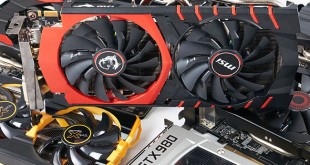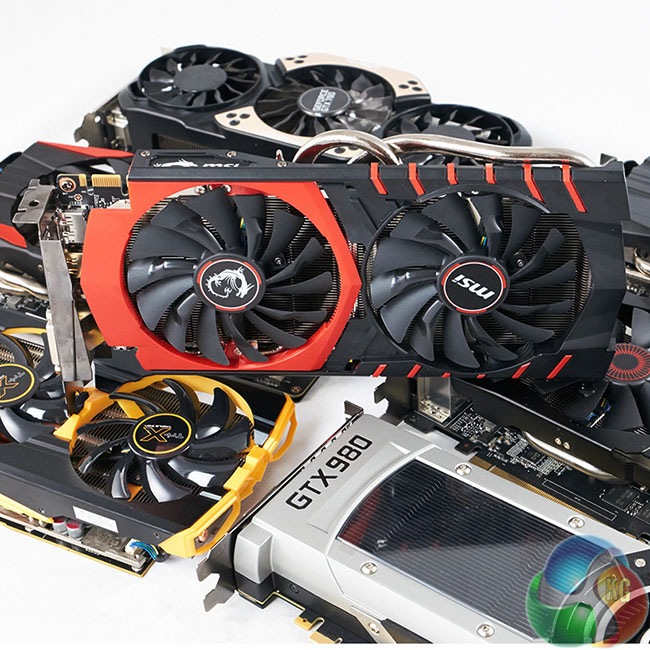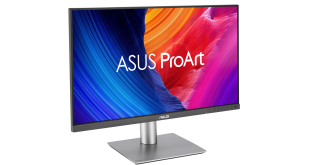
This week Nvidia launch their new GTX970 and GTX980 GPU's – based on the exceptionally efficient Maxwell architecture. In this review we look at a modified, overclocked solution from partner MSI – the GTX970 Gaming 4G. Not only does this card ship with a tasty overclock, but it is one of the prettiest graphics cards we have ever seen.

The MSI GTX 970 Gaming 4G is undoubtedly a looker. The two tone red and black colour scheme looks fantastic and we love the red vertical ‘flashes' over the black section of the cooler.
Even though we have a handful of reviews ready for the launch today, Nvidia's Maxwell architecture deserves a little discussion before we get into testing the MSI GTX970. If you are a regular reader of KitGuru then you will already have studied our multiple analysis of the lower level GTX750Ti solution throughout the year.
The GTX750ti has been one of the most exciting cards that Nvidia have released in recent years – performance is close to the HD7850 while consuming half the power at the socket – and all without the need for a PCIe power cable. It produces such a modest heat emission that the Asus GTX750Ti Strix OC we reviewed recently didn't need to spin the fans most of the time, even when gaming.
AMD really are so far behind now when it comes to power consumption that they will need to release a new architecture to compete. Not an easy thing to do overnight, but we hope they can become competitive again in the coming months. Competition is good for us, the consumer.
The Maxwell architecture has been designed to deliver twice the performance per watt of previous generation Geforce hardware. It sounds easy enough on paper to achieve, but the real world challenges for Nvidia have been complex.
| GPU | GeForce GTX 680 (Kepler) | GeForce GTX 980 (Maxwell) | Geforce GTX 970 (Maxwell) |
| Streaming Multiprocessors | 8 | 16 | 13 |
| CUDA Cores | 1536 | 2048 | 1664 |
| Base Clock | 1006 mhz | 1126 mhz | 1050 mhz |
| GPU Boost Clock | 1058 mhz | 1216 mhz | 1178 mhz |
| Total Video memory | 2GB | 4GB | 4GB |
| Texel fill-rate | 129 Gigatexels/Sec | 144.1 Gigatexels/Sec | 109.2 Gigatexels/Sec |
| Memory Clock | 6000 mhz | 7000 mhz | 7000 mhz |
| Memory Bandwidth | 192 GB/sec | 224 GB/sec | 224 GB/s |
| ROPs | 32 | 64 | 64 |
| Manufacturing Process | 28nm | 28nm | 28nm |
| TDP | 195 watts | 165 watts | 145 watts |
The new GM204 GPU is very efficient. The Maxwell SM has been rebalanced so that the CUDA cores are fully utilised more often. Doing so saves power and enhances overall performance. The L2 cache size in the GM204 is 2MB, or four times larger than the GK104. The addition of extra cache means that fewer requests to the GPU memory are needed – again reducing power consumption and pushing more performance.
The Geforce GTX 970 is equipped with 7Gbps memory. Those of you with higher resolution monitors, or running in a multi screen configuration will also be pleased to hear that there is 4GB of GDDR5 memory on the card, not 3GB – this memory will push 224 GB/s sec. Nvidia have added a new compression engine to reduce the demand on DRAM bandwidth.
The MSI GTX970 Gaming 4G has received a core clock enhancement to 1,140mhz, from 1,050mhz on the reference design. The GDDR5 memory remains untouched, as we would expect – its certainly not going to be a bottleneck.
 KitGuru KitGuru.net – Tech News | Hardware News | Hardware Reviews | IOS | Mobile | Gaming | Graphics Cards
KitGuru KitGuru.net – Tech News | Hardware News | Hardware Reviews | IOS | Mobile | Gaming | Graphics Cards



Looking good so far. Expecting even better performance after 2-3 driver releases 🙂
I like the price point. The performance it pretty excellent.
This is a future proof card meaning you probably shouldn’t get this just for 1080p gaming since there are a lot of other cheaper cards out there that does just fine at 1080p.
I’m curious, were you able to run the MSI 970 on just the single 8-pin like you can on the ASUS 970? If so then I don’t think you can consider the extra 6-pin a con. And if it can’t, then oh well, at least there should be some extra stability benefits to it.
I can totally understand the ‘lower than they could be’ clocks out of the box, as if they are clocked to high out of the box and they get a few defunct chips that can’t handle it, it would be far worse PR than ‘look there might be even more potential in your chips’.
I understand the drop of the half star as nothing is perfect but goddamn the 970 looks like it comes about as close a it gets!
So far MSI Twin Frozr V is the best cooler.
So far MSI Twin Frozr V is the best cooler.
Why are the stats compared to the GTX 680 and not the 780/ 780Ti etc?
The issue is, other than looks, what separates these two cards? Performance is almost identical across the board from FPS to temps and thermals.
i cant decide between the msi and asus 970. I prefer the single 8 pin connector and backplate on the asus but the MSI has better cooling is cheaper and is slightly faster =/
Msi site says the hdmi is 1.4 not 2.0
What gives?
you have cash or not, must get it, performance better than 780 + 150Watts + cheaper? OMFGGG
To be fair, the MSI seems to beat the Asus by a couple of fps in every game that I looked at.
Is the extra 6pin for overclocking? I read on another article that the 900 series can handle a lot of overclocking. So, would it be for overclocking stability if it’s able to surpass the amount the 8 pin can handle?
So for 700$ (two GTX 970), we can play in 4K without problems.
Official Certification by the HDMI consortium. The components are 2.0 (NVIDIA spec) just the card itself hasn’t passed the certification yet. No issue.
We actually use the 6 and 8-pin to separate the voltage between the GPU VRM and the memory/io/fan vrm. so, no, it doesn’t guzzle more power when connected, but does allow us to deliver cleaner power to the card.
I suspected that, but thank you for confirming since i had no 4k monitor here to confirm.
The card rocks.
This information should have been delivered to reddit/r/buildapc as that is where most conversation surrounding components and sales occur. Many people were concerned about the 1.4 listing and bought a different brand instead. At a minimum, if should have been mentioned to your selected YouTube reviewers so they could have clarified.
the MSI GTX 970 Gaming is by a long shot better than asus and especially the EVGA cards.
the reference design for the GTX 970 uses a 4+1 power phase design. 4 for the GPU, 1 for the memory. asus uses a 5+2 phase design while MSI beats them all with a 6+2 configuration.
also, asus strix GTX 970 uses a single 8 pin PCE I power input while MSI uses two power inputs, 8 pin and another 6 pin. this will allow much higher overclocks, assuming the chip on your card can handle it.
i have a pair of MSI GTX 970 Gaming cards. one overclocks to 1500MHz the other to 1560MHz with no voltage mods. in SLI they are about one and half times faster than the R9 295×2 i returned last week. they are also dead silent, use less power and produce less heat.
i paid about $680 for the two of them. at this price the performance is just incredible. i’ve been a long time fan of nvidia (but i have owned ATI/AMD cards) but i did not expect them to price this card so low.
Having looked at further benchmarks, the MSI GTX 970 blows the competition away – cheaper than the Strix, more powerful, just as quiet, bigger OC headroom. Unless AMD come out with something amazing, it’ll be my next gpu.
I think the Min and Average values in the Metro: LL benchmark are incorrect and have been confused for the Average and Max values respectively.
I just tested my MSI GTX 970 Gaming 4G (at stock like here with exactly the same settings) and my Average: 45 fps and Max: 118. You show the same numbers as the Min and Average respectively.
Shut up
Crazy how this beast rivals the GTX 980 stock AND is ultra efficient/silent. Madness!